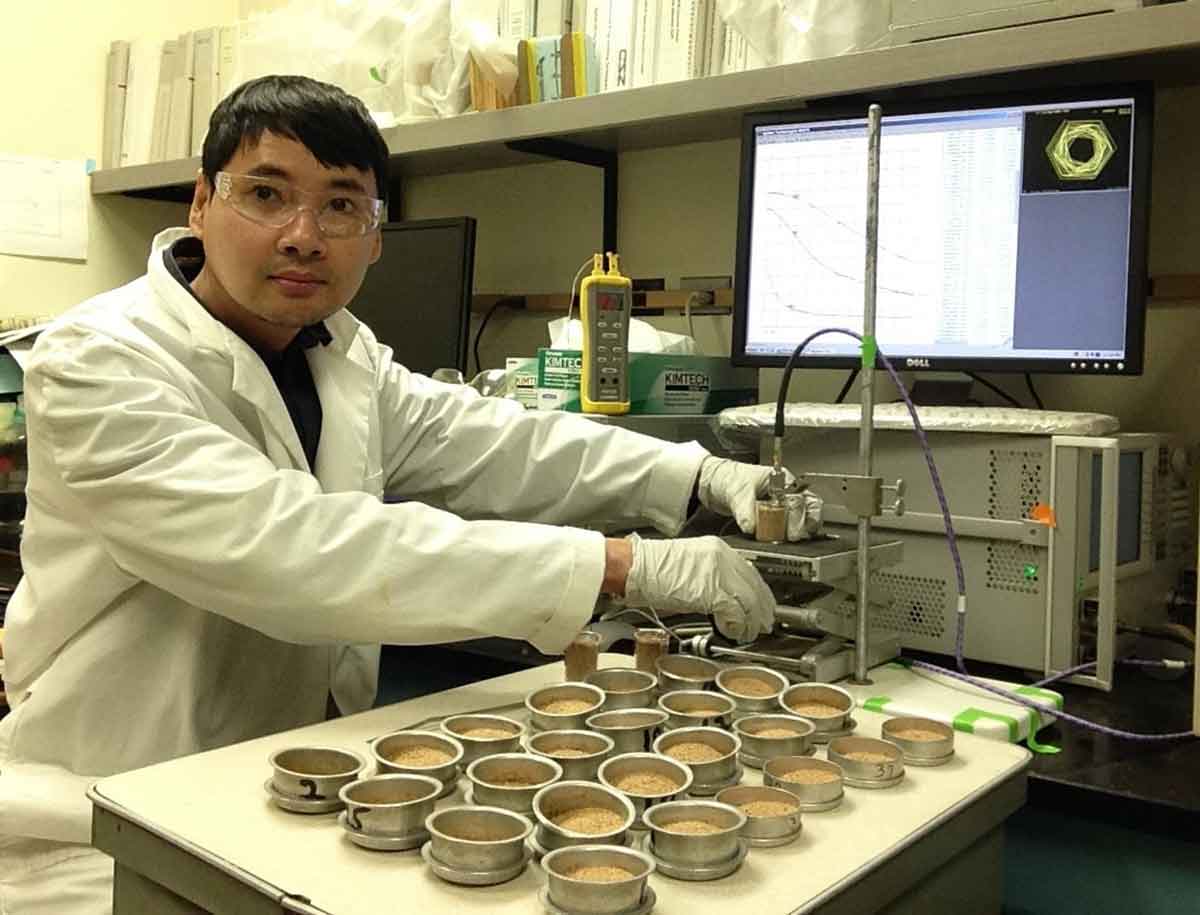Meet Sakol Julrat, Ph.D.
In both the natural world and industrial settings, the moisture content of materials is a critical factor related to many different natural and production processes. Accurate determination of moisture ensures quality control in the commercial production of many goods and household commodities. It is required by the standards set by the International Organization for Standardization (ISO).

Sakol Julrat, Ph.D., a participant in the U.S. Department of Agriculture Agricultural Research Service Research Participation Program, applied his engineering background to the development of an accurate moisture sensing technique. He is pictured here studying dielectric permittivity measurement on biomass material. (Photo courtesy of ARS)
In both the natural world and industrial settings, the moisture content of materials is a critical factor related to many different natural and production processes. Accurate determination of moisture ensures quality control in the commercial production of many goods and household commodities. It is required by the standards set by the International Organization for Standardization (ISO).
Sakol Julrat, Ph.D., wanted to do his part to ensure the safety and quality of agricultural products produced in the United States.
Julrat received his doctoral degree in computer engineering from Prince of Songkla University in his hometown of Songkhla in southern Thailand. His thesis topic revolved around moisture content determination using microwave measurement, which aligns perfectly with his background in microwave engineering. Microwave frequencies are a form of electromagnetic radiation ideal for moisture sensing in products such as grain and seed.
Julrat was searching online for a postdoctoral research opportunity to expand on his knowledge when he learned of the U.S. Department of Agriculture (USDA) Agricultural Research Service (ARS) Research Participation Program.
The USDA ARS Research Participation Program provides opportunities for students, postgraduates, established scientists and faculty to participate in programs, projects and activities at ARS-designated facilities to help ARS solve agricultural problems of high national priority.
Under the mentorship of research scientist Samir Trabelsi, Ph.D., an electronics engineer for the Quality and Safety Assessment Research Unit (QSARU), Julrat was able to apply his microwave engineering
knowledge and assist in developing sensing techniques to accurately measure the moisture content levels of specific agricultural products.
Julrat’s research is necessary for quality assurance throughout the manufacturing and handling processes. The moisture content determines suitability for harvest and storage. For example, if the moisture content of a commodity is too high for safe storage, then the commodity must be dried to avoid spoilage.
During Julrat’s three years as a research participant at the U.S. National Poultry Research Laboratory (USNPRC) in Athens, Georgia, he had the opportunity to develop equipment such as the Biomass Materials Analysis (BMA) moisture meter. The BMA meter determines the exact water content in various biomass materials. Biomass is organic waste material from plants or animals that can be converted to use as a renewable source for energy.
Through the USDA ARS Research Participation Program, Julrat built upon his knowledge and grew as a research professional. This experience provided him the opportunity to make valuable connections with laboratory staff and industry leaders that will serve him well as he advances in his career.
Julrat recommends the program to others because it provides an excellent opportunity to be immersed in research with a national laboratory and the chance to interact with colleagues who share similar passions for science, technology, engineering and math (STEM).
The USDA Agricultural Research Service Research Participation Program is funded by USDA and is administered through the U.S. Department of Energy’s (DOE) Oak Ridge Institute for Science and Education (ORISE). ORISE is managed for DOE by ORAU.